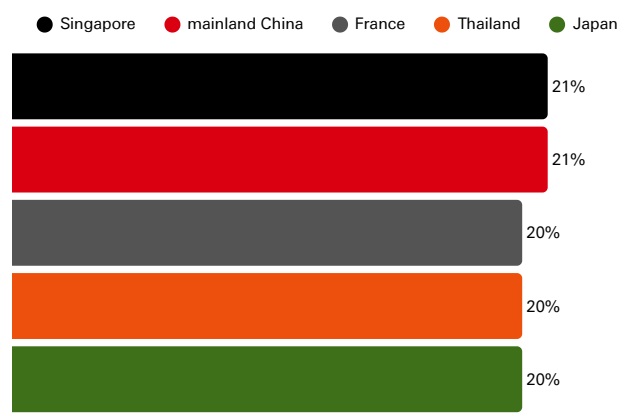- Article

- Market & Regulatory Insights
- Outlook
HSBC Global Trade Pulse Survey
Global businesses adapting to trade uncertainty and building resilience
International businesses are adapting to a new global trade reality as they deploy diverse strategies to navigate evolving trade and tariff headwinds while managing rising costs and working capital pressures. This is according to HSBC’s Global Trade Pulse survey, which gathers insights from 6,750 decision-makers across 17 markets including 250 in Vietnam regarding tariffs and trade.
Clarity and confidence fuel adaptability
After a challenging first half of 2025, businesses are finding their footing and have more clarity on the trade and tariff landscape. The survey reveals that 67% of businesses now feel more certain about the impact of trade policy on their operations than they did six months ago, while 77% say they can easily understand recent trade policy changes. This growing sense of certainty is a crucial first step in enabling firms to make informed decisions and plan ahead.
As insight into the new trade landscape deepens, revenue concerns have eased markedly, with only 22% fearing severe revenue losses above 25%, down from 37% six months ago. Most companies now expect revenues to increase in the next six months (53%) and over the next two years (58%).
Diverse coping strategies and trade corridors drive resilience
Companies are actively deploying a broad range of strategies to mitigate trade risks, safeguard long-term competitiveness and adapt to a volatile trade environment. More than three-quarters (76%) are taking multiple actions in response to increased costs, such as passing on costs to customers, renegotiating contracts, and investing in automation and AI.
International expansion and rethinking revenue models remain key priorities for global firms. Half of all companies (50%) plan to enter new markets, 47% are rebalancing products and services, and 43% are exploring mergers or acquisitions. 75% of businesses are reassessing or have already made changes to where major processing and assembly activities take place – a clear sign that the global supply chain map continues to shift in response to evolving risks and opportunities.
Globally, confidence in long-term trade ambitions remains robust. 88% of respondents expect to grow international trade in the next two years. At the same time, 75% of international businesses say that trade uncertainty has encouraged them to evolve and explore new opportunities – a sign that changes to trade are acting as a catalyst for reinvention, not retreat.
Diversification is also a central theme in managing trade disruption. 84% of businesses are diversifying their supply chains – making it the most common supply chain coping strategy reported by companies. Larger corporates lead the way: 44% of firms with annual revenues above USD2 billion have already diversified their supply chains, compared to 37% of those with revenues below USD500m. This highlights that scale and resource availability play a key role in how effectively companies can manage trade volatility.
Market trends
Preparedness for trade regulations has emerged as a key driver of business adaptability allowing companies to better respond to policy shifts and make strategy adjustments. Businesses in the USA feel most prepared for trade regulation shifts, with 52% of firms in this market feeling well informed and prepared, compared to 35% in Europe and just 32% in East and North Asia.
In addition to diversification, businesses are seeking new trade corridors to build resilience against instability. Europe and Southeast Asia are the top destinations for expansion (40% and 36% respectively), followed by North America and East/ North Asia (both 32%).
Asia for Asia gains momentum: New trade map is shaping up
As the tariff landscape becomes clearer, a new trade map is shaping up, with Asian firms dialling up their focus on Asia in their trade strategy.
Among Asian firms, 41% plan to increase reliance on Southeast Asia; 34% plan to increase reliance on East and North Asia; and 29% plan to increase reliance on South Asia. 30% of Asian firms also plan to increase reliance on Europe.
Asia is an extremely attractive market for companies globally, not only because it hosts the Regional Comprehensive Economic Partnership (RCEP), the world's largest free-trade agreement, but also due to its expanding consumer base, its vibrant digital economy, and its well-established supply chains.
Vietnamese businesses adapt to the New Normal
Vietnamese businesses demonstrate above-average confidence in trade growth, increasing certainty around policy, and realistic expectations for supply chain challenges. More than 7 in 10 (73%) of Vietnamese firms feel more certain about the impact of trade policy than they did six months ago, while more than 7 in 10 (72%) find it easy to understand the impact of recent trade-policy changes.
With the tariff dust beginning to settle, Vietnamese firms expect supply-chain disruption to have a slightly lower impact on revenue than six months ago. They forecast a 15% negative impact on revenue over the next two years, down from 20% in the first Trade Pulse survey from approximately six months ago.
Our research data suggest that businesses in Vietnam are adjusting to the current landscape. While they are slightly less worried about revenue than before, they continue to be aware of potential dangers.
Vietnamese businesses have changed market strategies at rates far exceeding global peers, while simultaneously navigating heightened tariff and competitive pressures. They have taken multiple actions in response to increased costs, such as passing on costs to customers, increased operational efficiency or productivity, renegotiating contracts, and investing in automation and AI.
In particular, 9 in 10 of Vietnamese businesses have or are considering applying AI or machine learning to optimise sourcing, logistics routes, or inventory levels in response to trade volatility (90%) and using data to better forecast risks and demand (92%).
Also, they have already or are considering making internal changes to better respond to uncertainty (91%), developing risk management plans (90%), and rebalancing product or service mix to mitigate trade exposure (90%).
Although Vietnamese businesses are taking proactive steps to strengthen resilience, trade-related financial pressures persist. Nearly half of them (46%) have experienced some pressure but it's manageable within existing structures while over 1 in 5 (21%) have faced major liquidity or cash flow pressure since 2024.
Surajit Rakshit, Country Head of Global Trade Solutions, HSBC Vietnam, comments: “The recent tariff shifts are signaling that working capital optimisation is no longer just a financial hygiene exercise but a strategic lever for growth and resilience. Vietnamese companies are now prompted to treat working capital optimisation as a forward looking strategy to build resilience, support supply-chain diversification, unlock growth capacity, and become more attractive to global buyers.”
Vietnam’s global ambition endures
In the face of trade uncertainty or disruption, international expansion remains one of the key priorities of Vietnamese businesses to mitigate trade risks. They are increasing their sales to Singapore and mainland China, followed by France, Thailand, and Japan. They are also increasing their reliance on regional trade corridors and Europe. Companies in the $500m–$2bn revenue range are leading the shift within the continent with 50% increasing reliance on Southeast Asia (vs 32% among $50m–$500m firms), and in the same segment 46% are increasing reliance on East/North Asia (vs. 23% $50m–$500m firms). Overall, 90% of Vietnamese businesses feel confident that they will be able to grow international trade over the next 2 years, slightly higher than the global average of 87%.
Take a closer look at our solutions
Global Trade Solutions
As trade evolves, so do we. Learn how we can help your business trade with confidence.






